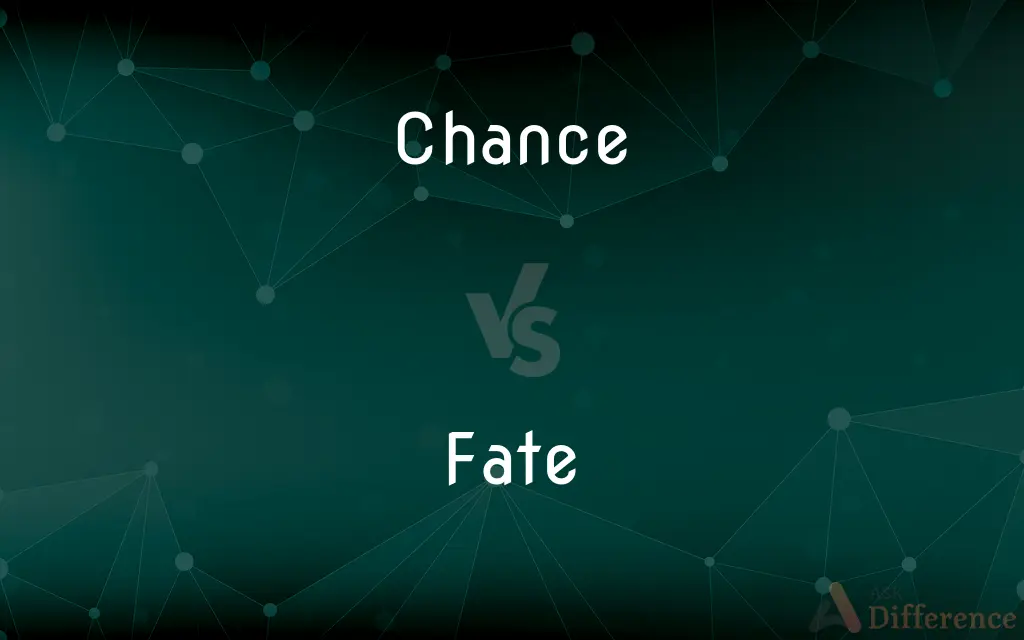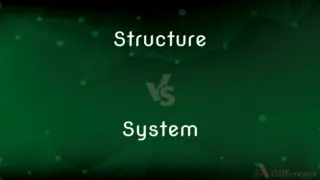Chance vs. Fate — What's the Difference?
Edited by Tayyaba Rehman — By Fiza Rafique — Updated on April 2, 2024
Chance is the occurrence of events in the absence of any obvious intention or cause, relying on randomness, whereas fate is the predetermined course of events often seen as inevitable or destined to happen.

Difference Between Chance and Fate
Table of Contents
ADVERTISEMENT
Key Differences
Chance refers to the randomness or unpredictability in the occurrence of events, implying that outcomes can vary widely without discernible pattern or purpose. Fate, on the other hand, suggests a predetermined sequence of events that is beyond human control, often considered to be set by a cosmic or divine force, leading to an inevitable outcome.
The concept of chance allows for the possibility of different outcomes in a given situation, emphasizing the role of randomness and probability in determining results. Whereas fate denotes a fixed trajectory that events will follow, regardless of individual actions or desires, underscoring a lack of agency or choice in the matter.
In discussions about human life and decision-making, chance is often seen as an element that introduces uncertainty and variability, making outcomes unpredictable. Fate, conversely, is viewed as a predetermined path that individuals are destined to follow, suggesting that choices may ultimately lead to preordained results despite apparent freedom.
The perception of chance can vary significantly among individuals and cultures, with some viewing it as a fundamental aspect of existence that drives innovation and variability. Fate, however, is often associated with philosophical or religious beliefs about the universe's structure and individual destinies, implying a certain order or purpose to the unfolding of events.
While chance is a concept embraced in many scientific and mathematical models to explain variability and probability, fate is more commonly found in literary, philosophical, and religious contexts, where it serves to explore themes of destiny, morality, and the human condition.
ADVERTISEMENT
Comparison Chart
Definition
The occurrence of events by random or accidental means.
The predetermined and inevitable sequence of events.
Control
Implies a lack of control over outcomes.
Suggests outcomes are controlled by a higher power or law.
Predictability
Events are unpredictable and subject to variability.
Events are considered fixed and unchangeable.
Role in Decision-Making
Introduces uncertainty and variability in outcomes.
Implies that choices may be futile against a predetermined end.
Context
Often used in scientific, statistical, and everyday contexts.
Common in philosophical, religious, and literary discussions.
Compare with Definitions
Chance
The occurrence of events in an arbitrary manner.
They met by chance on a train.
Fate
The force or principle believed to predetermine events.
They felt that fate brought them together.
Chance
The probability of an event occurring without deliberate intention.
By chance, they both arrived at the party at the same time.
Fate
A condition or situation destined for someone.
Resigning to his fate, he awaited the decision.
Chance
A concept signifying randomness in event outcomes.
Winning the lottery is purely a matter of chance.
Fate
A predetermined course of events often seen as inevitable.
It was her fate to become a renowned artist.
Chance
An unpredictable element in situations.
The game's outcome depends largely on chance.
Fate
An inevitable destiny or outcome.
Facing his fate, he accepted the challenges ahead.
Chance
A risk or possibility of something happening.
There's a good chance of rain tomorrow.
Fate
The end or outcome of a person's life or endeavor.
The hero met his fate bravely.
Chance
The unknown and unpredictable element in happenings that seems to have no assignable cause.
Fate
The supposed force, principle, or power that predetermines events
Fate did not favor his career.
Chance
A force assumed to cause events that cannot be foreseen or controlled; luck
Chance will determine the outcome.
Fate
The inevitable events predestined by this force
It was her fate to marry a lout.
Chance
Often chances The likelihood of something happening; possibility or probability
Chances are good that you will win. Is there any chance of rain?.
Fate
A final result or consequence; an outcome
What was the fate of your project?.
Chance
An accidental or unpredictable event
"He sprang to his feet and turned to run. At the same moment by a lucky chance the moon broke through the clouds" (Arthur Conan Doyle).
Fate
Fates Greek & Roman Mythology The three goddesses, Clotho, Lachesis, and Atropos, who control human destiny. Used with the.
Chance
A favorable set of circumstances; an opportunity
A chance to escape.
Fate
The presumed cause, force, principle, or divine will that predetermines events.
Chance
A risk or hazard; a gamble
Took a chance that the ice would hold me.
Fate
The effect, consequence, outcome, or inevitable events predetermined by this cause.
Chance
(Games) A raffle or lottery ticket.
Fate
An event or a situation which is inevitable in the fullness of time.
Chance
(Baseball) An opportunity to make a putout or an assist that counts as an error if unsuccessful.
Fate
(mythology) Fate (one of the goddesses said to control the destiny of human beings).
Chance
Caused by or ascribable to chance; unexpected, random, or casual
A chance encounter.
A chance result.
Fate
(biochemistry) The products of a chemical reaction in their final form in the biosphere.
Chance
To take the risk or hazard of
We thought we could jump over the puddle, but we were not willing to chance it.
Fate
(embryology) The mature endpoint of a region, group of cells or individual cell in an embryo, including all changes leading to that mature endpoint
Chance
To have the fortune (to be or do something); happen
"My eye chanced to fall on the wizened houseplant on the windowsill" (Elisabeth Brink).
Fate
(transitive) To foreordain or predetermine, to make inevitable.
The oracle's prediction fated Oedipus to kill his father; not all his striving could change what would occur.
Chance
Used with the impersonal subject it and a following clause or infinitive to indicate the occurrence of a usually unexpected or chance event
"Now it chanced that this car-line was owned by gentlemen who were trying to make money" (Upton Sinclair).
Fate
A fixed decree by which the order of things is prescribed; the immutable law of the universe; inevitable necessity; the force by which all existence is determined and conditioned.
Necessity and chanceApproach not me; and what I will is fate.
Beyond and above the Olympian gods lay the silent, brooding, everlasting fate of which victim and tyrant were alike the instruments.
Chance
(countable) An opportunity or possibility.
We had the chance to meet the president last week.
Fate
The element of chance in the affairs of life; the unforeseen and unestimated conitions considered as a force shaping events; fortune; esp., opposing circumstances against which it is useless to struggle; as, fate was, or the fates were, against him.
A brave man struggling in the storms of fate.
Sometimes an hour of Fate's serenest weather strikes through our changeful sky its coming beams.
Chance
(uncountable) Random occurrence; luck.
Why leave it to chance when a few simple steps will secure the desired outcome?
Fate
The three goddesses, Clotho, Lachesis, and Atropos, sometimes called the Destinies, or Parcæwho were supposed to determine the course of human life. They are represented, one as holding the distaff, a second as spinning, and the third as cutting off the thread.
Chance
(countable) The probability of something happening.
There is a 30 percent chance of rain tomorrow.
Fate
An event (or a course of events) that will inevitably happen in the future
Chance
(in plural as chances) probability; possibility.
Fate
The ultimate agency that predetermines the course of events (often personified as a woman);
We are helpless in the face of Destiny
Chance
What befalls or happens to a person; their lot or fate.
Fate
Your overall circumstances or condition in life (including everything that happens to you);
Whatever my fortune may be
Deserved a better fate
Has a happy lot
The luck of the Irish
A victim of circumstances
Success that was her portion
Chance
Happening by chance, casual.
Fate
Decree or designate beforehand;
She was destined to become a great pianist
Chance
(obsolete) Perchance; perhaps.
Chance
To happen by chance, to occur.
It chanced that I found a solution the very next day.
Chance
To befall; to happen to.
Chance
To try or risk.
Shall we carry the umbrella, or chance a rainstorm?
Chance
To discover something by chance.
He chanced upon a kindly stranger who showed him the way.
Chance
(Belize) To rob, cheat or swindle someone.
The car broke down a week after I bought it. I was chanced by that fast-talking salesman.
Chance
A supposed material or psychical agent or mode of activity other than a force, law, or purpose; fortune; fate; - in this sense often personified.
It is strictly and philosophically true in nature and reason that there is no such thing as chance or accident; it being evident that these words do not signify anything really existing, anything that is truly an agent or the cause of any event; but they signify merely men's ignorance of the real and immediate cause.
Any society into which chance might throw him.
That powerWhich erring men call Chance.
Chance
The operation or activity of such agent.
By chance a priest came down that way.
Chance
The supposed effect of such an agent; something that befalls, as the result of unknown or unconsidered forces; the issue of uncertain conditions; an event not calculated upon; an unexpected occurrence; a happening; accident; fortuity; casualty.
In the field of observation, chance favors only the mind that is prepared.
It was a chance that happened to us.
The Knave of Diamonds tries his wily arts,And wins (O shameful chance!) the Queen of Hearts.
I spake of most disastrous chance.
Chance
A possibility; a likelihood; an opportunity; - with reference to a doubtful result; as, a chance to escape; a chance for life; the chances are all against him.
So weary with disasters, tugged with fortune.That I would get my life on any chance,To mend it, or be rid on 't
Chance
Probability.
Chance
To happen, come, or arrive, without design or expectation.
If a bird's nest chance to be before thee.
I chanced on this letter.
How chance, thou art returned so soon?
Chance
To take the chances of; to venture upon; - usually with it as object.
Come what will, I will chance it.
Chance
To befall; to happen to.
Chance
Happening by chance; casual.
Chance
By chance; perchance.
Chance
A possibility due to a favorable combination of circumstances;
The holiday gave us the opportunity to visit Washington
Now is your chance
Chance
An unknown and unpredictable phenomenon that causes an event to result one way rather than another;
Bad luck caused his downfall
We ran into each other by pure chance
Chance
A risk involving danger;
You take a chance when you let her drive
Chance
A measure of how likely it is that some event will occur;
What is the probability of rain?
We have a good chance of winning
Chance
Be the case by chance;
I chanced to meet my old friend in the street
Chance
Take a risk in the hope of a favorable outcome;
When you buy these stocks you are gambling
Chance
Come upon, as if by accident; meet with;
We find this idea in Plato
I happened upon the most wonderful bakery not very far from here
She chanced upon an interesting book in the bookstore the other day
Chance
Occurring or appearing or singled out by chance;
Their accidental meeting led to a renewal of their friendship
Seek help from casual passers-by
A casual meeting
A chance occurrence
Common Curiosities
Can fate be altered?
Traditionally, fate is viewed as unchangeable, a predetermined path that one is destined to follow.
Can chance lead to positive outcomes?
Yes, chance can result in positive or negative outcomes, depending on the circumstances and probabilities involved.
What distinguishes chance from fate?
Chance involves randomness and unpredictability in events, while fate implies a predetermined, inevitable course of events.
How does chance affect decision-making?
Chance introduces uncertainty and variability, influencing decisions by acknowledging the possibility of different outcomes.
Is fate universally accepted?
Belief in fate varies widely among individuals and cultures, often influenced by philosophical or religious views.
Do fate and free will contradict each other?
The relationship between fate and free will is a complex philosophical question; some argue they are incompatible, while others believe they can coexist.
How do people use the concept of chance?
People use the concept of chance to describe or calculate the likelihood of various outcomes in uncertain situations.
How is chance measured or quantified?
Chance is often quantified using probabilities, statistical models, or mathematical calculations.
Can the outcome of a game be considered a matter of fate?
While some may view the outcome as fated, it is generally seen as a result of chance and skill.
Is believing in fate beneficial?
For some, believing in fate provides comfort or a sense of purpose, though it may lead to fatalism or a feeling of helplessness for others.
How do cultural beliefs influence perceptions of chance and fate?
Cultural beliefs significantly shape how individuals interpret and value the randomness of events and the concept of a predetermined path.
How does the belief in fate affect one's outlook on life?
Believing in fate can lead to a sense of resignation or destiny, affecting decisions, relationships, and personal goals.
Is it possible to control chance?
While one can manage or influence risk, the inherent nature of chance means it cannot be fully controlled.
What role does fate play in literature and mythology?
Fate is a central theme in many stories and myths, used to explore questions of destiny, morality, and human agency.
What scientific fields study chance?
Fields like probability theory, statistics, quantum mechanics, and chaos theory explore the concept and implications of chance.
Share Your Discovery

Previous Comparison
Structure vs. System
Next Comparison
Autotroph vs. ProducerAuthor Spotlight
Written by
Fiza RafiqueFiza Rafique is a skilled content writer at AskDifference.com, where she meticulously refines and enhances written pieces. Drawing from her vast editorial expertise, Fiza ensures clarity, accuracy, and precision in every article. Passionate about language, she continually seeks to elevate the quality of content for readers worldwide.
Edited by
Tayyaba RehmanTayyaba Rehman is a distinguished writer, currently serving as a primary contributor to askdifference.com. As a researcher in semantics and etymology, Tayyaba's passion for the complexity of languages and their distinctions has found a perfect home on the platform. Tayyaba delves into the intricacies of language, distinguishing between commonly confused words and phrases, thereby providing clarity for readers worldwide.















































